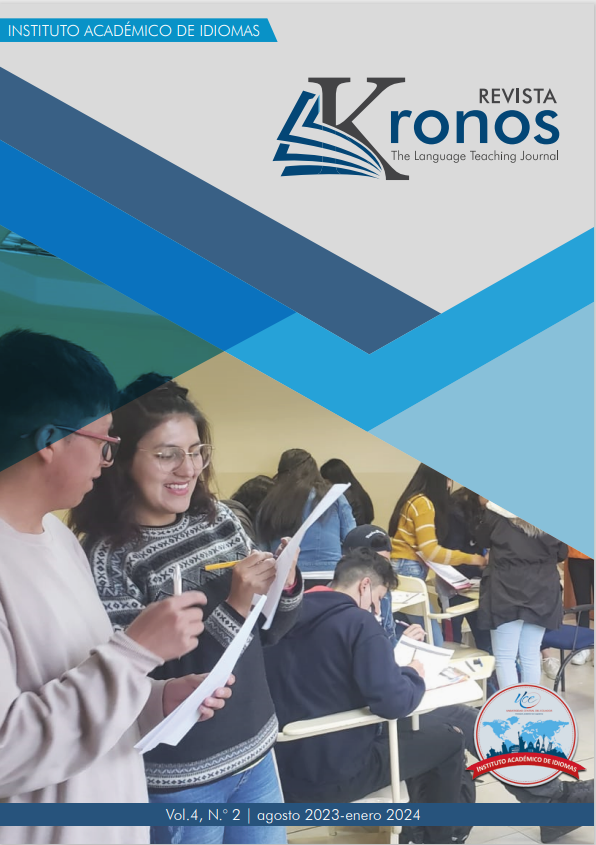The effect of the PQ4R strategy on EFL learners’ reading comprehension at a middle high school in Cuenca, Ecuador
DOI:
https://doi.org/10.29166/kronos.v4i2.4692Keywords:
English learning, PQ4R reading strategy, Students’ reading comprehensionAbstract
The present research study evaluates the impact of the PQ4R strategy on reading comprehension skills among tenth-grade EFL students. Thirty-two tenth-grade middle high school students took part in this study. It employed a quantitative experimental approach with the pre-experimental design in the form of one group pre-test-post-test design. A Cambridge A2 reading test (KET exam) was used as a pretest and post-test. Pretest was applied before the treatment, while the post-test was administered after the learners were instructed through the PQ4R strategy in reading classes. Scores were analyzed and interpreted using descriptive and inferential statistics. Pretest results demonstrated a mean score of 5.25 (out of 10) with a standard deviation of 0.92, indicating low English reading performance among the participants before implementing the PQ4R strategy. However, after the intervention, the post-test results revealed a significant improvement in reading skills, with a mean score of 7.25 (out of 10) and a standard deviation of 1.00. In addition, the t-test for paired samples indicated a significant difference between the mean scores of the pretest and post-test (t = 3.81, p = 0.000, α=0.05), and Cohen's d effect size demonstrated a large effect size (2.08 > 0.80). These findings indicate that using practical language instruction approaches such as the PQ4R strategy could substantially enhance EFL learners' reading comprehension skills.
Downloads
References
Agustiani, M. (2019). The Uses of pq4r and ssr Strategies in efl Reading Classroom. eternal (English Teaching Journal), 10(1). Retrieved from https://doi.org/10.26877/eternal.v10i1.3903 DOI: https://doi.org/10.26877/eternal.v10i1.3903
Al-Qawabeh, R. H., Aljazi, A. A., & Al-Qawabeh, R. H. (2018). The Effectiveness of Using pq4r Strategy in Teaching Reading Comprehension in Arabic Language Subject among Ninth Grade Students’ Achievement in Jordan. World, 5(2). Retrieved from http:// DOI: https://doi.org/10.22158/wjer.v5n2p159
dx.doi.org/10.22158/wjer.v5n2p159
Alvarez Llerena, C. L., & Ha, X. V. (2022). Exploring English Language Teaching in Ecuadorian Secondary Schools: Teachers’ Beliefs about the National Curriculum Reform. Language Related Research, 13(5), 117-0. Retrieved from https://lrr.modares.ac.ir/article-14-60644-fa.html DOI: https://doi.org/10.52547/LRR.13.5.5
Amaya, C. & Salinas, W. (2021, October 6). Desarrollo de una unidad didáctica usando la estrategia de lectura pq4r: vista previa, pregunta, lectura, reflexión, recitación y revisión. Universidad Distrital Francisco José de Caldas. Retrieved from http://hdl.handle.net/11349/28387
Brooks, G., Clenton, J., & Fraser, S. (2021). Exploring the Importance of Vocabulary for English as an additional language learners’ reading comprehension. Studies in Second Language Learning and Teaching, 11(3), 351-376. Retrieved from https://doi.org/10.14746/ssllt.2021.11.3.3 DOI: https://doi.org/10.14746/ssllt.2021.11.3.3
Burgin, X., & Daniel, M. C. (2017). Exploring English language teaching in an Ecuadorian urban secondary institution. gist-Education and Learning Research Journal, (14), pp.107-134. Retrieved from https://doi.org/10.26817/16925777.364 DOI: https://doi.org/10.26817/16925777.364
Cohen, J. (1992). Quantitative methods in psychology: A power primer. Psychological Bulletin, 112(1), 155-159. Retrieved from https://web.mit.edu/hackl/www/lab/turkshop/readings/cohen1992.pdf DOI: https://doi.org/10.1037//0033-2909.112.1.155
Creswell, J. W. (2013). Research design: Qualitative, quantitative, and mixed methods approaches. Sage publications. Retrieved from https://www.ucg.ac.me/skladiste/blog_609332/objava_105202/fajlovi/Creswell.pdf
Dakhiel, M. A. & Al sulami W. F. (2021). The Effectiveness of pq4r Strategy on the Development of Reading Comprehension Skills of the English Language Course among Second Intermediate Grade Students (Female Students). Journal of Educational and Psychological
Science, 5(8), 0-20. Retrieved from https://doi.org/10.26389/AJSRP.R210920efl Ecuadorian Curriculum. (2016). In M. d. Ecuador, English as a Foreign for Subnivel Superior (p. 28). Retrieved from https://educacion.gob.ec/wp-content/uploads/downloads/2016/08/EFL-for-Subnivel-Superior-of-EGB-ok.pdf
Fernández, C., & Baptista, P. (2013). Metodología de la Investigación-Roberto Hernández
Sampieri. Journal of Chemical Information and Modeling, 53(9). Retrieved from https://www.academia.edu/20792455/Metodolog%C3%ADa_de_la_Investigaci%C3%B3n_5ta_edici%C3%B3n_Roberto_Hern%C3%A1ndez_Sampieri
Fitriani, O., & Suhardi, S. (2019, July). The effectiveness of pq4r (preview, question, read,
reflect, recite, review) in reading comprehension skills. In 6th International Confer ence on Educational Research and Innovation (iceri 2018) (pp. 523-526). Atlantis
Press. Retrieved from https://doi.org/10.2991/iceri-18.2019.52 DOI: https://doi.org/10.2991/iceri-18.2019.52
Hezam, T. A., Ali, J. K. M., Imtiaz, S., Saifi, M. A., & Islam, M. R. (2022). Challenges and Problems of Reading Comprehension Experienced by efl Learners. Journal of English Studies in
Arabia Felix, 1(2), 11-21. Retrieved from https://doi.org/10.56540/jesaf.v1i2.28 DOI: https://doi.org/10.56540/jesaf.v1i2.28
Khusniyah, N. L. (2018). The Impact of pq4r Strategy Use on efl Students’ Reading Com prehension. Edulangue: Journal of English Language Education, 1(2), 166-177. Retrieved from https://doi.org/10.20414/edulangue.v1i2.266 DOI: https://doi.org/10.20414/edulangue.v1i2.266
Mickan, A., Slesareva, E., McQueen, J. M., & Lemhöfer, K. (2023). New in, old out:
Does learning a new language make you forget previously learned foreign lan guages? Quarterly Journal of Experimental Psychology. Retrieved from https://doi.org/10.1177/17470218231181380 DOI: https://doi.org/10.1177/17470218231181380
Nanda, D. W., & Azmy, K. (2020). Poor reading comprehension issue in efl classroom among Indonesian secondary school students: Scrutinizing the causes, impacts and possible solutions. English: Journal of Language, Education, and Humanities, 8(1), 12-24.
Retrieved from http://dx.doi.org/10.22373/ej.v8i1.6771 DOI: https://doi.org/10.22373/ej.v8i1.6771
Rahmadia, P., & Fatimah, S. (2020). The Effect pq4r Strategy and Reading Motivation for
Students’ Reading Comprehension. anglo-saxon: Journal of the English Language Education
Study Program, 11(2), 214-222. Retrieved from https://doi.org/10.33373/as.v11i2.2693 DOI: https://doi.org/10.33373/as.v11i2.2693
Ruipérez, B. O. (2022). The Role of Metacognitive Strategies in Blended Learning: Study
Habits and Reading Comprehension. ried. Revista Iberoamericana de Educación a Distancia, 25(2), 219-234. Retrieved from https://doi.org/10.5944/ried.25.2.32056 DOI: https://doi.org/10.5944/ried.25.2.32056
Saeedi, G., Khanmohammadi, A., & Mahmmodi, H. (2016). Reading Comprehension and
Its Importance in Learning English as a Second Language. ijefl, 1(1), 61-69. Retrieved
from http://dx.doi.org/10.21462/ijefl.v1i1.1 DOI: https://doi.org/10.21462/ijefl.v1i1.1
Thyer, B. A. (2012). Quasi-experimental research designs. Oxford University Press. Retrieved from https://www.researchgate.net/publication/286122828_Quasi-Experimental_Research_Designs DOI: https://doi.org/10.1093/acprof:oso/9780195387384.001.0001
Zuriah, E. (2020). Improving students’ reading comprehension achievement through pq4r
strategy to the eleventh-grade students of sma negeri 19 palembang. elte Journal (English Language Teaching and Education), 8(1), 123-133. Retrieved from https://jurnal.univpgri-palembang.ac.id/index.php/elte/article/view/4802
Published
How to Cite
Issue
Section
License
Copyright (c) 2023 William Santiago Chuquiguanga

This work is licensed under a Creative Commons Attribution-NonCommercial-ShareAlike 4.0 International License.












